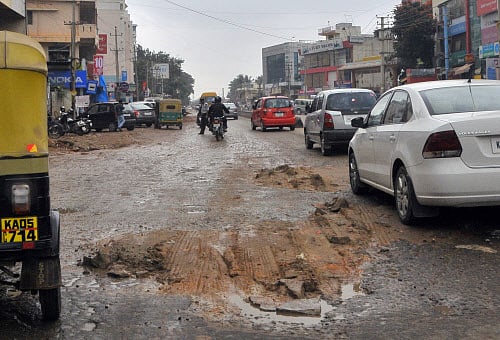
The State government’s decision to hand over road laying works to its subsidiary unit, Karnataka Rural Infrastructure Development Limited (KRIDL), has raised many eyebrows given its poor track record marred by a series of scams.
The government, as well as the Bruhat Bangalore Mahanagara Palike (BBMP), have come under sharp criticism for the pothole-ridden roads in the City.
The BBMP could not repair the roads citing rain as the reason. Recently, Chief Minister Siddaramaiah announced in Belgaum that Rs 243 crore would be spent to improve the City roads and work would be entrusted.
Civic experts said entrusting work to KRIDL would mean bypassing the transparency laws and giving contract to it without floating tenders. KRIDL also charges 11 per cent more than the tender amount. If the tenders are floated there is every likelihood that the contractors would quote less than the tender amount, they said.
Shoddy job
A BBMP official, quoting anonymity, said entrusting work to KRIDL would mean that the BBMP would pay at least 21 per cent more than the tender amount. Despite paying high, there were instances of KRIDL doing a shoddy job.
The KRIDL had come under scanner when the fake bills scam was exposed in 2011. Most of the works were entrusted to KRIDL. Questioning accountability of KRIDL, the former mayors of Bangalore, in their PIL in the Karnataka High Court, had sought probe into the works carried out by it.
One of the petitioners, P R Ramesh, though favoured the urgent repair of roads, demanded a thorough probe into their poor quality that could not withstand the rainy season.
“There is no denying that better roads are required. But there is also a need to probe why the roads laid in the past were washed away during the rainy season and crater-like potholes surfaced,” he said.
He asked the government to investigate KRIDL’s way of executing works. “KRIDL never executes work on its own. It entrusts work to the same contractors who also work for the BBMP, BDA or the BWSSB.”
Reconsidering exemption
He asked the government to reconsider the exemption given to KRIDL under the Transparency Act. The government should also take into consideration the track record of the firm, he said.
“Entrusting job to a firm which has a poor track record would mean that you are rewarding it rather than punishing it. Government should not encourage such activities,” Ramesh added.
Phanisai Bharadwaj, a social activist, also objected entrusting the work to KRIDL by bypassing the transparency rules. “The government should have floated tenders allowing better contractor firms in the country to lay the roads. What is the need to give contract to an agency which has come under scanner in the past,” asked Bharadwaj.
